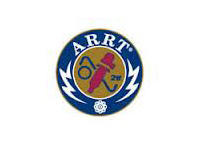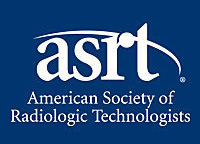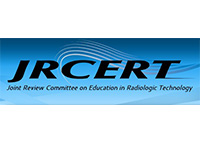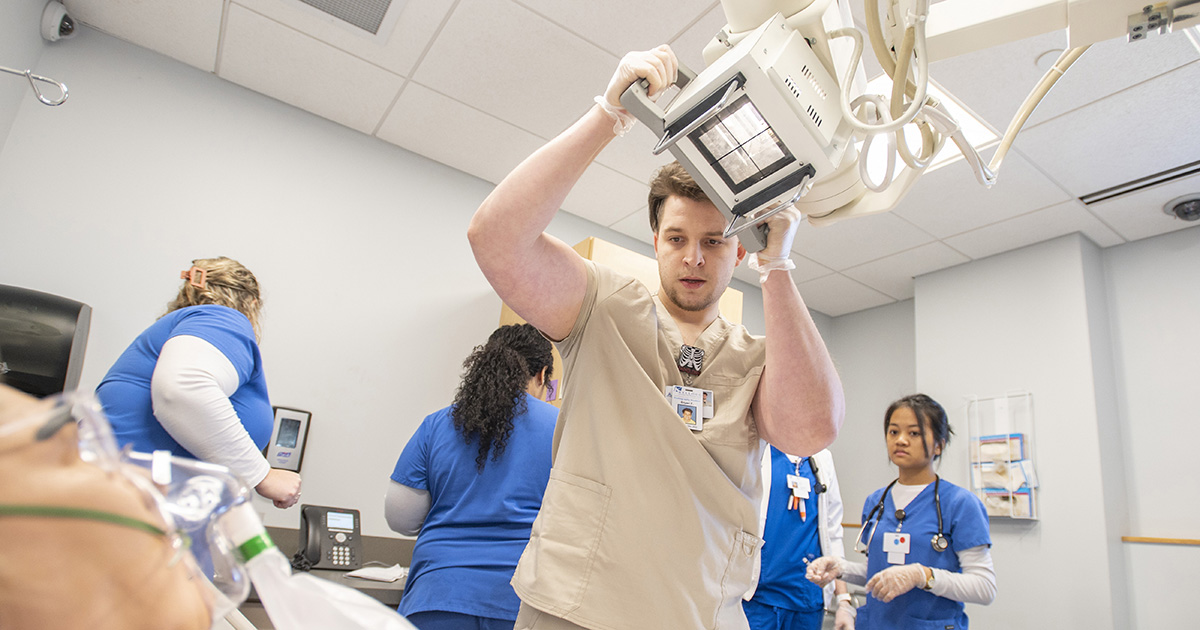
RADIOGRAPHY
The deadline to apply for KCC’s 2024-25 Radiography Program is Thursday, May 23! See details, application materials and more at kellogg.edu/radi-admissions.
The Radiography Program at Kellogg Community College offers students the opportunity to earn an associate degree in a field that is both rewarding and exciting. Radiographers are essential members of the health care team who use sophisticated X-ray equipment to produce high-quality medical images of the human body. Through KCC’s Radiography Program coursework, students learn patient care skills, pathologies, radiation protection, radiographic positioning and image production.
Radiography Program students will complete five academic semesters. The program’s didactic, laboratory and clinical requirements demand the time commitment of a full-time student. Successful completion of the program leads to an Associate in Applied Science in Radiography degree and eligibility to take the national certification exam administered by the American Registry of Radiologic Technologists (ARRT).
For more information about KCC’s Radiography Program, see:
- Associate of Applied Science in Radiography Program Map
- Radiography (RADI) course descriptions
- Radiography Program FAQs
- Radiography Program Student Manual 2023-2025
- Radiography Admissions
- Kellogg Community College Academic Catalog and Student Handbook
Accreditation
KCC’s Radiography Program is accredited by the Joint Review Committee on Educational Programs in Radiologic Technology. The program was reviewed in 2019 and given the full eight-year accreditation through September 2027. Students may contact JRCERT at:
JRCERT
20 N Wacker Dr.
Suite 2850
Chicago, IL 60606
312-704-5300
Fax: 423-304-5304
mail@jrcert.org
Additional Information
Radiography Careers
Radiographers are qualified to operate radiographic (X-ray) equipment; perform radiographic procedures; evaluate radiographic images for technical quality and adequate demonstration of anatomical structures; provide patient care essential to radiographic procedures; evaluate the performance of radiographic equipment; and provide optimum radiation protection for the patient, self and other staff members. Radiographers have the opportunity to seek advanced certification in Computed Tomography, Magnetic Resonance Imaging, Mammography, Vascular Interventional and Cardiac Interventional Technology.
Possible job areas/titles for graduates with an education in radiography include:
- Administrator/manager
- Application specialist
- Educator/clinical instructor
- Radiographer/radiologic technologist
- Sales
Projected Job Outlook & Salary Info
According to the Bureau of Labor Statistics, overall employment of radiologic technologists is expected to grow by 7%, increasing faster than average for all occupations.
As of March 31, 2020, the Mean Wage in Michigan for Radiologic Technologists was $54,750 to $58,680. According to the Annual Mean Wage by MSA, in some western Michigan counties the average Mean Wage for Radiologic Technologists was $62,000.
For the latest employment and wage estimates for radiography careers in Michigan, visit the U.S. Department of Labor’s Bureau of Labor Statistics website at bls.gov/oes/current/oes_mi.htm.
Why Study Radiography at KCC?
The Radiography Program at Kellogg Community College offers students the opportunity to experience hands-on learning in the classroom and apply these skills under the supervision of local technologists on patients in the hospital setting.
Nationally Accredited Program
The Joint Review Committee on Education in Radiologic Technology (JRCERT) has awarded Kellogg Community College’s Radiography Program the full eight-year accreditation award through September 2027. JRCERT accreditation ensures our students are provided a high-quality educational experience and that the program meets high standards. To learn more about the JRCERT, visit jrcert.org.
Clinical Experience
While attending KCC, students receive exceptional radiography training through didactic, laboratory and clinical experiences. Over four semesters, students participate in more than 1,000 hours of clinical work. KCC partners with six local hospitals that offer diverse learning experiences for all Radiography students:
- Bronson Methodist Hospital (Kalamazoo)
- Ascension Borgess Hospital (Kalamazoo)
- Bronson Battle Creek Hospital (Battle Creek)
- ProMedica Coldwater Regional Hospital (Coldwater)
- Oaklawn Hospital (Marshall)
- Battle Creek Veteran’s Affairs Medical Center (Battle Creek)
Passionate Instructors
At Kellogg Community College, students have access to passionate and dedicated instructors with more than 30 years of combined experience. Both instructors have worked in hospital settings and are Registered Technologists through the American Registry of Radiologic Technologists. Instructors have degrees ranging from bachelor’s to master’s degrees.
Hands-On Learning
Courses in the Radiography Program at Kellogg Community College are primarily held face-to-face, though there are a few courses offered in hybrid and online formats allowing students some flexibility as they study. In addition to clinical experiences, students practice in the classroom under the guidance of instructors to refine their patient care and positioning skills.
Radiography & Simulation Labs
Funds acquired through the state’s Community College Skilled Trades Equipment Program (CCSTEP) have enabled KCC to offer the latest radiography technology equipment in the industry. Students work with fixed and mobile radiography equipment to learn positioning skills and techniques that they will apply during clinical rotations.
A partnership with KCC’s Nursing Program also gives Radiography students access to new simulation labs on campus. Students will participate in trauma simulations where they encounter real-life scenarios and demonstrate knowledge and skills.
Clinical Education Access Requirements Statement
Students formally accepted to participate in Allied Health, Emergency Medical Services or Nursing programs are required to comply with clinical access requirements prior to and during clinical education placement in a hospital, outpatient clinic or other clinical education setting. These students are required to:
- Undergo a physical examination, immunizations, urine drug screen and criminal background check.
- Secure and maintain CPR certification in Basic Life Support (BLS) from the American Heart Association or Basic Life Support (BLS) for Health Care Providers from the American Red Cross throughout their clinical education participation.
- Adhere to the uniform and personal appearance standards according to program policies determined by clinical education providers.
- Maintain professional liability insurance according to College policies, as required by clinical education providers. The College ensures students are covered with professional liability insurance with the cost collected through lab fees.
Students participating in clinical education are not employees of a clinical education provider or of the College, and therefore are not covered by Workman’s Compensation insurance. It is highly recommended that students maintain personal health insurance while enrolled in an educational program.
Clinical education providers reserve the right to impose additional requirements at any time to ensure the safety of patients, employees and students. Clinical access requirements are determined by the College, according to the policies of the clinical education providers. The program director or coordinator will provide students with detailed direction and timeline for completing all clinical access requirements.
Compliance and cost of clinical access requirements are the responsibility of the student.
Latex Environment Statement
Students participating in Allied Health, Emergency Medical Services or Nursing courses are likely to have contact with latex throughout their educational experience. Due to the broad range of equipment, manikins, materials and supplies used in the College’s practice and simulation laboratories, and within a vast number of hospitals and other clinical education facilities, students with latex allergies considering any of these programs should direct questions to their physician prior to applying to the program to ensure safe participation in a latex environment.
Positive Drug Screen Statement
Applicants who earn admission into a KCC Health Sciences program must complete a drug screening test. This test checks for the presence of 10 substances, which are as follows:
- Marijuana
- Amphetamines
- Barbiturates
- Benzodiazepines
- Cocaine
- Methadone
- Methaqualone
- Opiates
- Phencyclidine
- Propoxyphene
Students with a positive drug screen will be deemed ineligible to participate in clinical education. Furthermore, as clinical education is a critical requirement of Nursing, Allied Health and Emergency Medical Services programs, the student will be dismissed from their current program of study. Students who would like to be considered for readmission should refer to their program’s policy of readmission and direct questions to the program director.
Service-Learning Requirement
Students who obtain an Associate degree or an Associate of Applied Science degree will be required to complete a service-learning experience. The final grade in the course must qualify for academic credit in order to receive the service-learning endorsement. RADI 224, Clinical Practicum, includes a service-learning component during the Summer semester of the program. Upon successful completion of this course and the service learning experience, students will earn the required service-learning endorsement for graduation.
Radiography Program Mission, Goals, and Outcomes
Mission Statement:
Building upon the mission, visions, and values of Kellogg Community College, the mission of the KCC Radiography Program is to provide a comprehensive curriculum that will graduate competent entry level radiographers. Graduates of the program will demonstrate critical thinking, professionalism, effective communication, patient safety, and ethical behavior thereby enhancing the healthcare experience of patients.
Goal 1: Graduates will demonstrate the knowledge and skills necessary for competency as an entry level radiographer.
Outcomes:
1.1 Student will apply knowledge of anatomy, physiology, and positioning to accurately demonstrate anatomical structures on image receptors.
1.2 Students will apply the principles of radiation protection to patients, self, and others.
1.3 Students will provide age-appropriate patient care, safety, and comfort.
Goal 2: Graduates will exhibit professional growth and development through the values,
attitudes, and behaviors necessary of an entry-level radiographer.
Outcomes:
2.1 Students will demonstrate positive work ethics with respect to policies and procedures within the clinical setting.
2.2 Students will demonstrate a commitment to their career in medical imaging.
2.3 Students will demonstrate the ability to work as a team player through cooperation and
initiative.
Goal 3: To prepare graduates to demonstrate the ability to apply critical thinking skills and problem solving in their field.
Outcomes:
3.1 Students will apply knowledge of technical factor selection and geometrical properties of the x-ray beam to accurately demonstrate anatomical structures on image receptors.
3.2 Students will demonstrate critical thinking with regard to decision-making and judgment in the clinical environment.
Goal 4: To prepare graduates to communicate effectively and professionally.
Outcomes:
4.1 Students will communicate effectively with patients, patient’s family, staff, administration, and physicians.
4.2 Students will demonstrate effective written communication skills.
Program Effectiveness Data
The following is the most current Radiography Program effectiveness data. Our programmatic accreditation agency, the Joint Review Committee on Education in Radiologic Technology (JRCERT), defines and publishes this information which can be accessed via https://www.jrcert.org/programs/kellogg-community-college/
Program Completion: The number of students who complete the program within the stated program length. The annual benchmark established by the program is 80%.

Job Placement: The number of graduates employed in the radiologic sciences compared to the number of graduates actively seeking employment in the radiologic sciences within twelve months of graduating. The five-year average benchmark established by the JRCERT is 75%.

Credentialing Examination: The number of students who pass, on the first attempt, the American Registry of Radiologic Technologists (ARRT) certification examination, or an unrestricted state licensing examination, compared with the number of graduates who take the examination within six months of graduation. The five-year average benchmark established by the JRCERT is 75%.
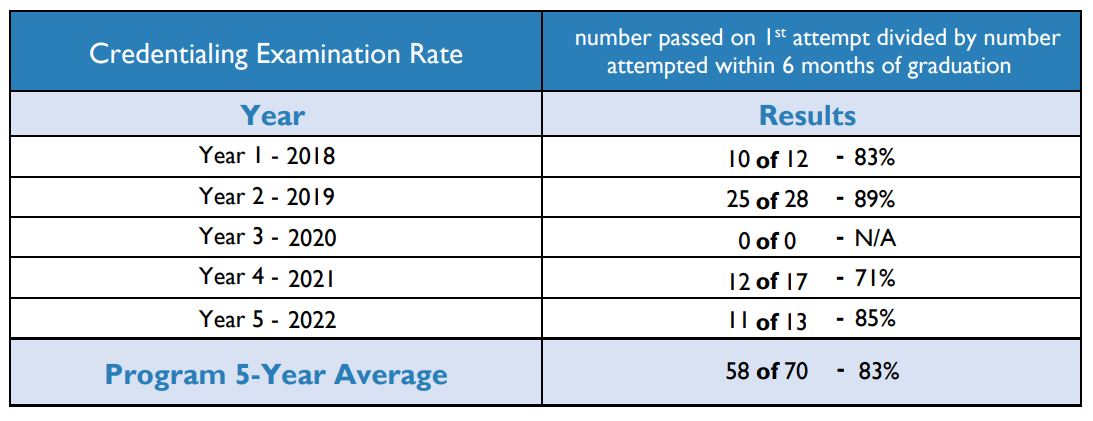
Advising & Transfer
View transfer guides outlining opportunities for students looking to transfer their KCC credits to a four-year institution. Contact Academic Advising at 269-965-4124 or advising@kellogg.edu to schedule an appointment to plot a personal transfer plan.
Radiography Contacts



